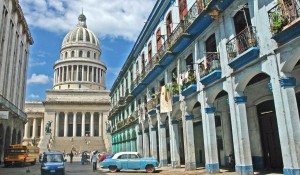CUBA-USA: OFFICE DEPOT DEPOT AND HUNDREDS OF CLAIMANTS SEEK COMPENSATION FOR EXPROPRIATED PROPERTY..
A subsidiary of Office Depot, Office Max, inherited the interest in a company expropriated by the Cuban revolution.
Office Max is an American company known in this country for their stores stationery and office supplies.
Office Max did not exist in January 1, 1959, when “bearded” rebels led by Fidel Castro entered Havana and took power in Cuba. Just it was founded in 1986, but Office Depot is now the company has the largest by assets expropriated in the early years of the Cuban Revolution claim.
Office Depot became involved in the matter when in 2013 he bought a competing company, Office Max, which in turn had inherited from its former owner, the timber company Boise Cascade, with interest in the Cuban Electric Co., an energy company expropriated by the revolution.
According to a US government certification, the assets lost in the island Cuban Electric reach US $ 267 million.
The figure is provided by the website of the Commission for Resolution of the Foreign Claims (Foreign Claims Settlement Commission), an agency of the US Department of Justice responsible for managing these demands.
The list brings together 8,821 claims between US companies and individuals who claim to have lost property at the hands of the revolutionary government of Cuba.
An amount of goods in 1960 dollars, reaching almost US $ 2,000 million, the bank said. The complainants have not yet seen a single dollar.
The obvious question is whether the Cuban government is willing to compensate those who claim to have lost property when he fell the government of Fulgencio Batista and Fidel Castro took office promising a massive redistribution of wealth from the island.
Many US companies expect to increase their operations in Cuba.
“The position of the Cuban government towards compensation for expropriation is very, very clear. There are laws, is in the Constitution, there are statements by leaders who accept the principle of compensation for expropriated property,” says Richard Feinberg, expert University of California-San Diego and the Brookings Institute, told the BBC.
Although it is unclear whether the Cuban government would accept the assessment of the properties or interests that may require applicants to compensation.
And the Cuban government has in turn its demands against Washington, ensuring they are owed compensation for damage suffered on account of the trade embargo imposed on Cuba by the US authorities.
Among the members of the list of candidates for compensation, are also oil companies of the time, such as Texaco, whose claim amounts to US $ 50 million. And several companies azucarero.Pero sector also many citizens who are asked to return them saved a few hundred dollars in savings from Cuban banks.
As Feinberg emphasizes the BBC, US firms and individuals are not in direct dispute with Cuba.
“They are being represented by the US government in discussions,” the professor. “One of the issues is agreed claims. On the one hand US claims for properties and on the other, Cuban counter-claims”.
The increasing normalization of relations between Cuba and the United States has increased the expectation to know what will happen to this dispute.
“Cubans have agreed to discuss the issue of claims. It is on the official agenda of the bilateral negotiations between governments,” he stresses.
So the fate of these disputes seem to be tied to political developments in relations between the two governments.
BBCMundo / Agencies / InternetPhotos / Excerpts / www.thecubanhistory.com
The Cuban History, Hollywood.
Arnoldo Varona Editor.
CUBA-USA: OFFICE DEPOT Y CIENTOS DE RECLAMANTES PIDEN INDEMNIZACIÓN POR BIENES EXPROPIADOS.
Una filial de Office Depot, Office Max, heredó el interés en una empresa cubana expropiada por la revolución.
Office Max es una empresa estadounidense conocida en ese país por sus almacenes de papelería y suministros de oficina.
Office Max no existía el 1 de enero de 1959, cuando los rebeldes “barbudos” encabezados por Fidel Castro entraron en La Habana y se tomaron el poder en Cuba. Recién fue fundada en 1986, pero Office Depot es hoy la empresa que tiene la reclamación más grande por bienes expropiados en los primeros años de la Revolución cubana.
Office Depot se involucró en el asunto cuando en 2013 compró una empresa competidora, Office Max, que a su vez había heredado de su antigua propietaria, la firma maderera Boise Cascade, intereses en la Cuban Electric Co., una empresa de energía expropiada por la revolución.
Según una certificación del gobierno estadounidense, los activos que perdió la Cuban Electric en la isla llegan a US$267 millones.
La cifra la proporciona el sitio web de la Comisión de Resolución de las Reclamaciones en el Extranjero (Foreign Claims Settlement Commission), una entidad del Departamento de Justicia de EE.UU. encargada de manejar esas demandas.
El listado agrupa a 8.821 reclamaciones entre empresas e individuos estadounidenses que aseguran haber perdido propiedades a manos del gobierno revolucionario de Cuba.
Un monto de bienes que, en dólares de 1960, llegan a casi US$2.000 millones, según la entidad. Los reclamantes no han visto hasta ahora ni un dólar.
La pregunta obvia es si el gobierno cubano está dispuesto a resarcir a los que aseguran haber perdido bienes cuando cayó el gobierno de Fulgencio Batista y asumió el mando Fidel Castro prometiendo una masiva redistribución de la riqueza de la isla.
Muchas empresas estadounidenses tienen expectativas de aumentar sus operaciones en Cuba.
“La posición del gobierno cubano frente a las compensaciones por expropiaciones es muy, muy clara. Hay leyes, está en la Constitución, hay declaraciones de dirigentes, que aceptan el principio de la compensación por propiedades expropiadas”, asegura Richard Feinberg, experto de la Universidad de California-San Diego y el Instituto Brookings, en declaraciones a BBC Mundo.
Aunque no está claro si el gobierno cubano aceptaría la valoración de las propiedades ni los intereses que podrían exigir los aspirantes a compensación.
Y el gobierno cubano tiene a su vez sus exigencias frente a Washington, asegurando que les deben compensación por los daños sufridos por cuenta del embargo comercial impuesto a Cuba por las autoridades estadounidenses.
Entre los integrantes de la lista de aspirantes a indemnización, se encuentran también empresas petroleras de la época, como Texaco, cuya reclamación asciende a US$50 millones. Y varias empresas del sector azucarero.Pero también muchos ciudadanos que piden que les devuelvan algunos cientos de dólares guardados en cuentas de ahorro de bancos cubanos.
Como recalca Feinberg a BBC Mundo, las firmas e individuos estadounidenses no están en litigio directo con Cuba.
“Están siendo representadas por el gobierno estadounidense en discusiones”, agrega el catedrático.”Uno de los temas acordados es el de las reclamaciones. De una parte reclamaciones estadounidenses por propiedades y por la otra, contra-reclamaciones cubanas”.
La creciente normalización de relaciones entre Cuba y Estados Unidos ha aumentado la expectativa por saber qué ocurrirá con esta disputa.
“Los cubanos han aceptado discutir el tema de las reclamaciones. Está en la agenda oficial de las negociaciones bilaterales entre gobiernos”, recalca.
Por lo que la suerte de estas disputas parece estar atada a la evolución política de las relaciones entre los dos gobiernos.
BBCMundo/Agencies/InternetPhotos/Excerpts/ www.thecubanhistory.com
The Cuban History, Hollywood.
Arnoldo Varona Editor.



 CUBA-USA: OFFICE DEPOT and Hundreds of Claimants Seek Compensation for Expropriated Property. + Cuba-EEUU- Office Depot y Cientos de Reclamantes Piden Indemnización por Bienes Expropiados .
CUBA-USA: OFFICE DEPOT and Hundreds of Claimants Seek Compensation for Expropriated Property. + Cuba-EEUU- Office Depot y Cientos de Reclamantes Piden Indemnización por Bienes Expropiados .


